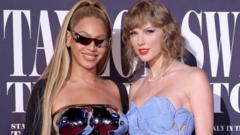As the Grammy Awards continue to evolve, the conversation around representation in the newly established Best African Music Performance category is intensifying, especially following the nomination of US artist Chris Brown alongside prominent Nigerian artists.
Who Should Be Considered African at the Grammy Awards?

Who Should Be Considered African at the Grammy Awards?
The inclusion of non-African artists in the African Music category raises questions about authenticity.
In 2023, the Grammy Awards introduced the Best African Music Performance category, which celebrated its inaugural winner, South Africa's Tyla, for her hit song "Water." This acknowledgment was largely welcomed within the African music community, signifying a step toward celebrating African talent on a global stage. However, the current nominations are stirring controversy, particularly because they include American musician Chris Brown, nominated for his single "Sensational," which prominently features Nigerian artists Davido and Lojay and incorporates Afrobeats influences.
This inclusion has sparked debates regarding the authenticity of the African music category and whether it should be reserved exclusively for artists of African descent. Grammy CEO Harvey Mason Jr defended the decision, emphasizing that music should be inclusive and that such cross-cultural collaborations mirror the historical developments seen in other music genres, such as Latin music and K-Pop. "If we start deciding who can or can't make a certain type of music, we lose the essence of creativity," he explained.
A significant part of this discussion lies in the perception that the Grammys appear overly focused on Afrobeats, a genre with deep roots in Nigeria and Ghana, at the expense of other diverse African music styles. Nigerian music journalist Ayomide Tayo noted that Afrobeats has enjoyed decades of global exposure, which has propelled it to the forefront of African music. "It's not that Afrobeats is inherently better," Tayo said, "but rather that it has consistently delivered outstanding music and events that captured the world’s attention."
The influence of the Nigerian diaspora, particularly in the US and UK, has also played a crucial role in the genre’s international popularity. Despite some concerns about genre imbalance this year, many industry professionals remain optimistic about the future prospects for other African music genres. Genres like amapiano, which has garnered significant attention and streaming success, are anticipated to gain more recognition in years to come.
Critics argue that the very title "Best African Performance" implies a limitation on what African music encompasses. Raphael Benza, from Johannesburg's Vth Season label, expressed hope that future nominations would reflect a broader spectrum of African music, beyond just Afrobeats.
Though Chris Brown's nomination has drawn mixed reactions, he has shown a consistent interest in African music, collaborating with prominent artists and even performing to enthusiastic crowds in South Africa recently. As the contemporary landscape of African music continues to grow, the expectation is for varied representations in the Grammy categories to better showcase the continent's musical diversity.
African artists, including earlier Grammy winners, have a proud history even before the Best African Music Performance award was introduced. The hope persists that as the global reach of African music expands, the Grammys will evolve further to embrace the multitude of styles and talents emerging from this vibrant continent.
This inclusion has sparked debates regarding the authenticity of the African music category and whether it should be reserved exclusively for artists of African descent. Grammy CEO Harvey Mason Jr defended the decision, emphasizing that music should be inclusive and that such cross-cultural collaborations mirror the historical developments seen in other music genres, such as Latin music and K-Pop. "If we start deciding who can or can't make a certain type of music, we lose the essence of creativity," he explained.
A significant part of this discussion lies in the perception that the Grammys appear overly focused on Afrobeats, a genre with deep roots in Nigeria and Ghana, at the expense of other diverse African music styles. Nigerian music journalist Ayomide Tayo noted that Afrobeats has enjoyed decades of global exposure, which has propelled it to the forefront of African music. "It's not that Afrobeats is inherently better," Tayo said, "but rather that it has consistently delivered outstanding music and events that captured the world’s attention."
The influence of the Nigerian diaspora, particularly in the US and UK, has also played a crucial role in the genre’s international popularity. Despite some concerns about genre imbalance this year, many industry professionals remain optimistic about the future prospects for other African music genres. Genres like amapiano, which has garnered significant attention and streaming success, are anticipated to gain more recognition in years to come.
Critics argue that the very title "Best African Performance" implies a limitation on what African music encompasses. Raphael Benza, from Johannesburg's Vth Season label, expressed hope that future nominations would reflect a broader spectrum of African music, beyond just Afrobeats.
Though Chris Brown's nomination has drawn mixed reactions, he has shown a consistent interest in African music, collaborating with prominent artists and even performing to enthusiastic crowds in South Africa recently. As the contemporary landscape of African music continues to grow, the expectation is for varied representations in the Grammy categories to better showcase the continent's musical diversity.
African artists, including earlier Grammy winners, have a proud history even before the Best African Music Performance award was introduced. The hope persists that as the global reach of African music expands, the Grammys will evolve further to embrace the multitude of styles and talents emerging from this vibrant continent.






















